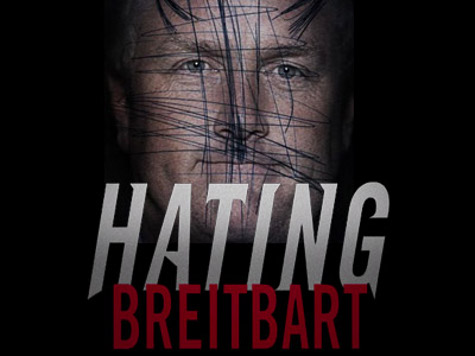
Last night during the RightOnline Welcome Event, filmmaker Andrew Marcus previewed a 17-minute clip from his upcoming documentary “Hating Breitbart.” While not giving away too much of the film’s approach to representing the late rebel media mogul, the footage displayed tremendous effort towards quality execution.
“Hating Breitbart” has been in the works for several years, and it’s easy to see why one would center a documentary around one man–love him or hate him, Andrew was an attention-grabbing and unpredictable figure. The image of the spitfire pundit prone to crass shenanigans hardly fit with his family devotion and domestic bliss, and the clip shown last night brought to bear that very same paradox.
For those who have read Andrew’s book Righteous Indignation, his history with father-in-law Orson Bean will be familiar. We first see the two of them onscreen, lightheartedly quarreling over an embarrassing anecdote for Andrew from the days of his courtship with wife Susie, who ends up settling the dispute via speakerphone.
Next, we see Andrew meeting with James O’Keefe in New York, with the young journalist fretting over the presence of an unvetted reporter. This becomes a broader discussion of how the media went after James and Hannah Giles after the release of their investigation of ACORN, culminating in Andrew’s infamous faceoff with Max Blumenthal, who insinuated O’Keefe was a white supremist in a Salon article.
The film strikes a great balance between interviews and on-location footage, telling the story just as much through the former as the latter–and through a wide variety of sources. From Andrew himself to Breitbart TV editor Larry O’Connor to a snide New York Times reporter grumbling O’Keefe’s exposés “aren’t the kind of journalism I was taught,” advocates and detractors alike paint a rich and engaging portrait for the viewer.
Conservative media has much to learn of subtlety and showing, not telling, but “Hating Breitbart” so far has delivered on that front. The music consists mostly of subtle cues mercifully reserved for moments of actual drama. The production value is outstanding, with polished cinematography that doesn’t take shortcuts like high-contrast, tint-heavy color correction.
And, most importantly, it doesn’t insult the viewer by dictating what to think and then giving no time to process information before moving on to a new talking point. This isn’t propaganda. It’s a film–one that will surely inform and entertain and could introduce Andrew and his legacy to a whole new audience.

COMMENTS
Please let us know if you're having issues with commenting.